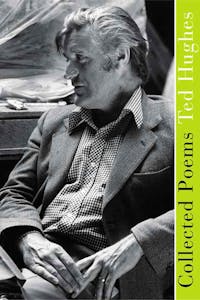Collected Poems
 Download image
Download image
ISBN10: 0374529655
ISBN13: 9780374529659
Trade Paperback
1376 Pages
$28.00
From his astonishing debut collection, Hawk in the Rain (1957), to the bestselling Birthday Letters (1998), Ted Hughes was one of postwar literature's truly prodigious poets. This remarkable volume gathers all of his published verse, from his earliest poems (published only in journals) through such groundbreaking volumes as Crow (1970), Gaudete (1977), and Tales from Ovid (1997).
Collected Poems also includes works Hughes composed exclusively for fine-press printers, poems he wrote in his capacity as England's Poet Laureate, and those children's poems he intended for adults as well. This omnium-gatherum of Hughes's work—a vast and invaluable reference for students, scholars, and all other poetry lovers—is both guided and animated throughout by a voice that, as Seamus Heaney once remarked, was "longer and deeper and rougher" than those of his contemporaries.
The book also features an insightful and far-reaching preface on the life and work of Ted Hughes by editor Paul Keegan, as well as over 130 pages of notes, indices, and appendices.
Reviews
Praise for Collected Poems
"Hughes was a great man and a great poet because of his wholeness and his simplicity and his unfaltering truth to his own sense of the world . . . He internalized the historical crises of the British nation and the ecological crises of planet Earth. He took on the grief of the generation that preceded him, the generation bound to the dead of the First World War, and transformed it into a healer's vision. And there was something homeopathic about his celebration of plants and creatures, since [his] poems were essentially reminders that we are all part of the same fabric, woven out of and into the palpable, mysterious universe."—Seamus Heaney
"Poets like Hughes—there are always a few in a century—are not just monuments; they are mirrors. They reflect the narratives of a poetry culture."—Eavan Boland
"Excellent . . . Collected Poems demonstrates in the aggregate Hughes's enormous output, the sureness of his voice, and the imaginative range of his mythic vision . . . The editorial decisions have been judicious . . . [This book shows] Hughes's impressive development in a career that spanned over forty years, overcame its setbacks, and gave us some of the more imaginative, forceful, and deeply felt poetry of the postwar period."—Carol Bere, Boston Review
"Whether he wrote poems about the farm, or wild birds and animals, or birthday masques for Royal occasions, Hughes had the same spontaneity of craft, which came from some inner joy in the ceremonial powers of poetry."—John Bayley, The Times Literary Supplement
"Offers a broader, deeper view than ever of [this] poet . . . Ted Hughes' Collected Poems is an instant masterpiece that will take us years to absorb fully—if indeed such an understanding is ever possible."—John Mark Eberhart, Chicago Tribune
"The main details of Hughes's life are well-known: after his National Service with the RAF, the dashing poet marries the brilliant American Sylvia Plath in 1954, and becomes an instant celebrity with the publication of Hawk in the Rain in 1957. While 'The Thought-Fox' scampers its way into numberless anthologies, he publishes the poems of Lupercal (1960) and Wodwo (1967), where he treats his own voice as a force of nature, threaded through a violent animism. His wife and his lover die by suicide. He makes a major artistic breakthrough with the widely praised sequence Crow (1971), which draws on his deep knowledge of English folklore, and sacrifices, for a kind of Zarathustrian bluntness, all lingering traces of formalism (though blank verse and ballad would continue to be favored methods). He writes plays and several children's books, and becomes a poet laureate in 1984, publishing a surprisingly good book of civic verse, Rain Charm for the Duchy, in 1992. His final volume, Birthday Letters, is a conflicted, front-page-news-making account [in verse] of his relationship with Plath. This enormous, rewarding compendium contains all of the above as well as numerous poems that were previously uncollected (such as the lovely, Williams-y miniature 'Snail' and the long 'Scapegoat and Rabies,' an indictment of the soldier culture that partly shaped Hughes); the entirety of his acclaimed Tales from Ovid; Hughes's appendices to the books as originally published; and copious bibliographic notes. Hughes is already canonical in Great Britain, and this volume, with its resolutely undomesticated bestiary, will mark out permanent space on the shelves of U.S. readers."—Publishers Weekly
"Lauded as a poetic genius and demonized for the suicide of his poet wife, Sylvia Plath, Hughes remains a controversial and compelling figure, one deserving of the serious attention this mammoth first collected edition of his poems demands. Precocious and ambitious, Hughes began winning literary awards with his debut collection, The Hawk in the Rain, thanks to Plath's encouragement. Earthy and mystical and steeped in folklore and myth, Hughes wrote lush and confident nature poems until Plath's death, after which his poetry turned spare and wary. In Crow, for instance, images of fallen trees, shrunken forms, camouflage, sickness, and stasis abound, followed by the torment of Prometheus on His Crag. But slowly the prolific and irrepressible Hughes regained his artistic grounding, and ultimately created a great treasury of original and exalted works, finally addressing his intense relationship with Plath in his final book, Birthday Letters, a resounding collection that stunned the literary world. Supported with extensive notes, this definitive volume brings Hughes into crisp focus as a complex and major poet."—Donna Seaman, Booklist


